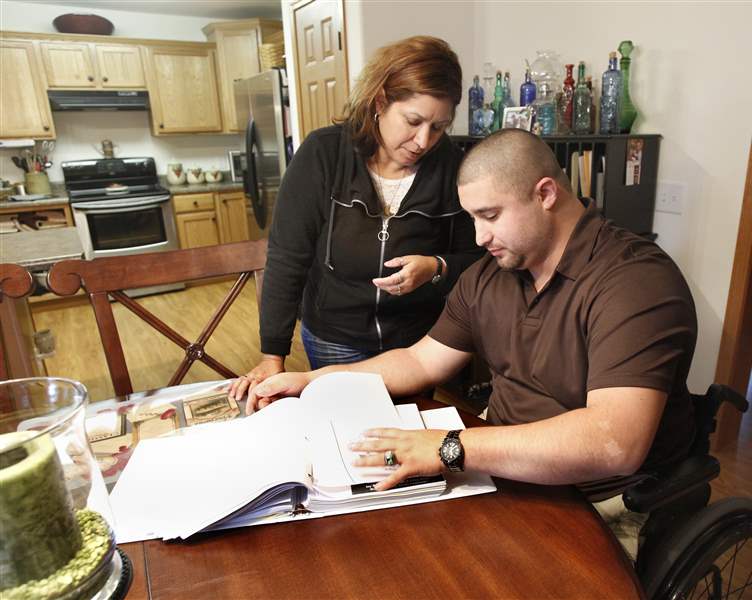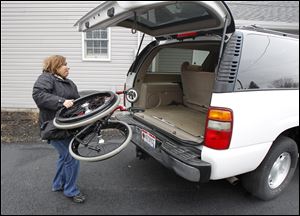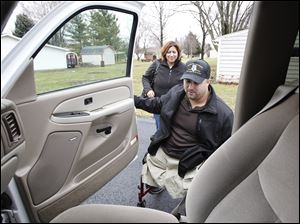
Mom tends to wounded son, wonders about her well-being
Revised bill covers fewer relatives who care for vets
3/14/2011
Cindy Parsons of Fostoria is glad her son, retired Army Sgt. Shane Parsons, is alive and at home after an explosion in Iraq injured him in 2006. She and others have quit their jobs to take care of wounded vets.
THE BLADE/DAVE ZAPOTOSKY
Buy This Image

Cindy Parsons of Fostoria is glad her son, retired Army Sgt. Shane Parsons, is alive and at home after an explosion in Iraq injured him in 2006. She and others have quit their jobs to take care of wounded vets.

Cindy Parsons puts her son's wheelchair in their vehicle. He lost both of his legs and suffered other injuries in an explosion in Iraq.

Shane Parsons prepares to get into the family vehicle in Fostoria with his mother, Cindy Parsons. She says that if she were not able to care for her son, the federal government would incur greater expenses.
"I'm 54 years old. I need health insurance," Mrs. Parsons said. "What's going to happen if I'm not able to take care of him?"
Shane Parsons, a retired Army sergeant who is now 25, suffered severe head trauma in the explosion 4 1/2 years ago, and, although he now can perform many basic functions for himself, he cannot read or write and has other cognitive impairments that affect his judgment, ability to focus, and personal safety.
Last May, Mrs. Parsons and other caregivers across the country were hopeful they would receive help geared to their specialized needs when President Obama signed the Caregivers and Veterans Omnibus Health Services Act.
The law, which was to be implemented by Jan. 30, was intended to extend a monthly stipend, health- care coverage, respite care, mental health services, and other benefits to family caregivers of the most seriously injured post-9/11 veterans.
That deadline passed, though, and now the U.S. Department of Veterans Affairs has offered a watered-down plan to implement the program with narrower eligibility requirements. Less than a third of the projected 3,500 families expected to benefit would be covered.
It was a blow to Americans who, in some cases, have been caring for a wounded loved one for nearly a decade.
"A lot of the families, especially those who have been doing this for some time, they finally felt there was a light at the end of the tunnel," said Steve Nardizzi, director of the Wounded Warrior Project, which lobbied in support of the bill. "They had marked their calendars for Jan. 31, feeling that finally their struggles would be recognized and they would get some support, and of course they were completely deflated when that time passed."
Mrs. Parsons is not sure she would have even qualified for the benefits, but she knows that if she's not able to care for her son, the VA would incur a far greater expense if he were in an institutional setting.
He spent nearly a year in an assisted-living facility in Texas before moving in full time with his mother in November in a modular home that was donated to them by the Coalition to Support America's Heroes.
"The cost for Shane to be in an assisted-living center versus my medical care -- there's no comparison in cost," she said. "Why can't they do that? If something happens to me, it's going to cost the government so much more."
In Washington, the desire to help caregivers of seriously injured veterans crossed partisan lines. The caregivers bill was approved by the House of Representatives in a resounding 419-0 vote -- something U.S. Rep. Marcy Kaptur (D., Toledo) knows happens very rarely.
Miss Kaptur said she's troubled that not as many caregivers may benefit from the program, but she said she understands the VA's workload.
"The VA right now has so many mandates," she said. "Because we are conducting two wars and we have so many returning wounded veterans, the pressure on the VA is enormous."
The VA has had less than a year to implement the new program, and new programs typically take "an inordinate amount of time" to get off the ground, she said.
At a March 2 congressional budget hearing, VA Secretary Eric Shinseki was taken to task by the Senate Veterans' Affairs Committee.
He expressed regret for the delays, saying the agency was attempting to implement "landmark new benefits for post-9/11 veterans that for the first time provide broad and direct financial and health-care support directly to the caregiver. We have not done this before, and we're working through the complexity of what this means."
Under questioning by Sen. Patty Murray (D., Washington), chairman of the committee, Mr. Shinseki said the VA planned to spend $66 million of the more than $308 million authorized for caregiver benefits for 2012. He estimated that "roughly 1,000" caregivers would qualify for the benefits initially.
Ms. Murray said that as written now, the VA's narrow definition of who qualifies excluded many of the people Congress wrote the law to cover.
Mr. Nardizzi of the Wounded Warrior Project said the original bill was intended to help severely injured veterans live at home and in their communities with the assistance of family members rather than wind up in institutions, but the VA "flipped the law on its head."
"That is not the appropriate outcome," he said. "It's not what the American public wanted. It's not what Congress wanted, and it's not what the President wanted."
Contact Jennifer Feehan at: jfeehan@theblade.com or 419-724-6129.